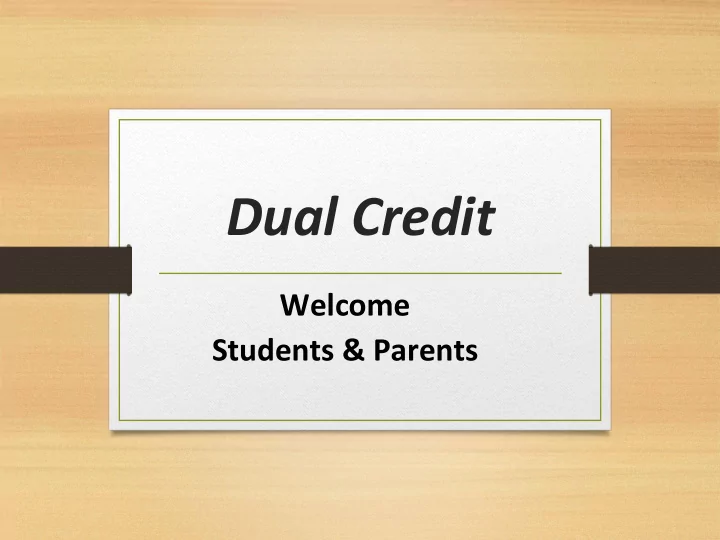

Dual Credit Welcome Students & Parents
WHAT is Dual Credit? ▪ ACC HS Program that allows eligible high school students residing in the ACC service area to enroll in college level classes. . ▪ Cost/Waiver Structure : Students receive a total of 12 individual course attempts/waivers, after which regular tuition & fees are assessed. ▪ Note: the Dual Credit program tuition/fees waiver is subject to change by the ACC Board of Trustees . . ▪ The ACC Dual Credit tuition & fees waiver is only applicable to courses on the ACC Core Curriculum , a Workforce Degree/Certificate , and Foreign Languages ( to include ASL ); all other courses will incur full/regular tuition & fees based on Residency.
What Dual Credit ISN’T… *Dual Credit courses are college courses with college faculty! • Advanced Placement (AP) • Dual Enrollment (OnRam ps) • • HS course Students enroll in HS course • • Taught by HS teacher Course taught by HS teacher and supported by UT faculty • College Board curriculum • Students can earn credit for • Credit-by-exam (AP test) nothing, HS course only, or • potentially both HS and college Cost for test credit • Must earn a certain score to • If college credit earned it is potentially receive college denoted on a UT transcript credit • • No TSI required No TSI required
Types of Dual Credit ▪ Dual Credit – Students complete a college course that meets ISD-approved graduation requirements (ex. HIST-1302 or GOVT-2305). ▪ Co-Enrollment – Students complete a college course and only receive college credit… The class is not needed for high school graduation (ex. GOVT-2306).
WHO is Eligible? ▪ Students who have successfully completed 8 th grade and attend either a public, private, charter, or home school. ▪ Students who have passed the appropriate sections of the State of Texas-approved college readiness assessment test (TSI-A) or submit acceptable exemption scores. * Please see the list of state-approved TSI waivers & exemptions in the HS Programs Enrollment Guidebook ▪ Students who have received permission from their parent/guardian and high school counselor/designee.
WHERE are Classes Offered? ▪ DC Students may take classes at their high school campus before, during, and after the school day ( where offered ). ▪ DC Students may also take classes at any ACC Campus, Center location, or via Distance Learning ( online ).
WHY Take DC Classes? ▪ Save $$$ (potentially 1yr+ of college!). ▪ Earn both high school and college credit. ▪ Gain college-level experience while in high school. ▪ Stand out on college admission applications. ▪ Graduate from college early or reduce semester course load.
2018-2019
College Vs. High School ▪ Students pay for textbooks/required materials. ▪ College classes can/will require a different level of work than high school classes. Also, different structure! ▪ Course content and student expectations are not altered in any way to accommodate students under 18 years of age College courses & Instructors = Academic Freedom ▪ Students are responsible for dropping/withdrawing from classes or they will receive a grade. Not attending class will not automatically drop you! ▪ ACC issues final letter grades only ( A, B, C, D, F, and W )
College Vs. High School ▪ ACC information goes directly to the student via the students ACCmail account. ▪ Dual Credit students have access to all the services provided by ACC, i.e. Learning Labs, Libraries, Testing Centers, etc. ▪ Parents are not automatically entitled to see student records, including absences, grades, and course progress due to federal privacy law (FERPA).
Student Success & Satisfactory Academic Progress (SAP) ▪ Student success is extremely important. College records are permanent and will follow students to colleges and universities upon high school graduation. ▪ Students must maintain a minimum cumulative GPA of 2.0 (“ C ” or better in all ACC classes) -and- they must complete 67% of all classes attempted (No F ’s or W ’s) ▪ Students who do not meet SAP may not be eligible for financial aid upon high school graduation until GPA and Completion Rate meet federal requirements.
The Good News… ▪ Dual Credit students do better than traditional students in terms of mean GPA and have better persistence from semester-to-semester. ▪ ACC credits transfer seamlessly to Texas public colleges and universities. U.S. History at ACC = U.S. History at UT, TAMU, TX State, etc. ▪ ACC credits can transfer widely to Texas private colleges, as well as out-of-state public & private colleges/universities.
More Good News… ▪ From the Dual Credit at Texas Completes Cadre Colleges - October 2018 : ACC's Dual Credit Program ranks… ▪ Ranked #2 in the state on First Year Persistence Rates at Universities of dual credit students who started at ACC ▪ Ranked #1 in First Year GPA at Universities of dual credit students who started at ACC ▪ Ranked #2 in State-wide Graduation Rates at Universities of dual credit students who started at ACC
Contact Us Leanne Jacobs Coordinator, HS Programs Enrollment & Partnerships Austin Community College 5930 Middle Fiskville Road Austin, TX 78752 http://sites.austincc.edu/dual-credit/ Email: dual@austincc.edu Office: (512) 223-7066
Recommend
More recommend